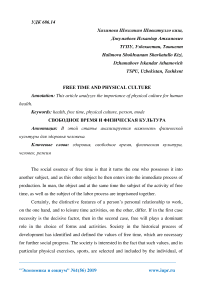Free time and physical culture
Автор: Halimova Shokhsanam Shavkatullo Kizi, Dzhumaboev Iskandar Athamovich
Журнал: Экономика и социум @ekonomika-socium
Статья в выпуске: 1-1 (56), 2019 года.
Бесплатный доступ
This article analyzes the importance of physical culture for human health.
Health, free time, physical culture, person, mode
Короткий адрес: https://sciup.org/140241375
IDR: 140241375
Текст научной статьи Free time and physical culture
The social essence of free time is that it turns the one who possesses it into another subject, and as this other subject he then enters into the immediate process of production. In man, the object and at the same time the subject of the activity of free time, as well as the subject of the labor process are imprisoned together.
Certainly, the distinctive features of a person’s personal relationship to work, on the one hand, and to leisure time activities, on the other, differ. If in the first case necessity is the decisive factor, then in the second case, free will plays a dominant role in the choice of forms and activities. Society in the historical process of development has identified and defined the values of free time, which are necessary for further social progress. The society is interested in the fact that such values, and in particular physical exercises, sports, are selected and included by the individual, of course, with personal voluntariness, as part of free time activities. Conscious acceptance of the necessary types of social behavior by the individual is the essence of free activity in free time.
Free time is used by an individual mainly in accordance with his individual ideas about the expediency of his spending, which are formed, as a rule, empirically. The social and psychological phenomena of tradition and conformism in accepting the norms of behavior of the directly surrounding public environment have an impact on human behavior in free time, including in exercises, sports, tourism, games.
In modern conditions, FCCs have a very high socio-economic significance for society as a whole and for an individual, as occupations develop and improve many important social and biological qualities of people, and have a progressive influence on the formation and harmonious development and upbringing of a person. This is taken into account by society in the planning and implementation of the free time of society as a whole and by individuals, since free time must be used rationally and efficiently from the point of view of the interests of society as a whole. In turn, each person should receive in the area of free time the maximum of the real possible in specific conditions and circumstances for his full and harmonious development, continuous improvement of the personality.
Among the main reasons for the termination of classes during the period of socio-economic reforms, according to the majority of respondents, were the lack of time, the high employment of household chores and childcare, poor health and the lack of sports clothing and footwear. In the last one and a half - two years, the attitude of the broad strata of the population to sports has changed significantly. Systematic training sessions significantly reduced (up to 2-4 times) by many sports enthusiasts. Amateur group and individual fitness and fitness classes at the place of residence and recreation received increasing popularity. This period in relation to the urban population to physical culture and sports can be assessed as a modern trend in the development and functioning of the physical culture and sports movement.
The increase in free time, the expansion of leisure can be accompanied by the growing spread of passive forms of activity, the consumption of material benefits of information and the reduction of vigorous activity, including occupations of the FCC, provided that leisure time and free time will be regulated spontaneously by gravity. An important social and pedagogical role is played by the organizing and regulating activities of the society, in particular the necessary standardization of the way of life, which to some extent has taken place at all times and in various social communities.
Progressive standardization of the household structure means the selection and active consumption of benefits and valuable for the development and improvement of the person and society of goods and the optimal cost structure of voluntary time spent. It rejects useless, purposeless and harmful for the harmonious development of a person of leisure activities, filling it with useful and pleasant content in attractive forms corresponding to the humanistic purpose of this activity. The inclusion and use of FCC funds in free time depends on the established or created anew household mode, the everyday life of the family, the usual allocation of time spent on various activities. At the same time, the economic conditions of the family, the prevailing value orientations and socio-psychological relations prevailing in it, as well as the intensity and effectiveness of external stimuli that shape the social behavior of family members, have a decisive influence.
Список литературы Free time and physical culture
- Виноградов П.А., Душанин А.П., Жолдак В.И. Основы физической культуры и здорового образа жизни. Москва., 1996.
- Виноградов П.А., Физическая культура и здоровый образ жизни. Москва., 1990.
- Жолдак В.И. Социология физической культуры и спорта. Кн. I. Москва.,1992.
- Фомин Н.А., Вавилов Ю.Н. Физиологические основы двигательной активности. -М.: Физкультура и спорт,1991.-224с.,
- Эффективная методика двигательной подготовки школьников.//Пути повышения физической культуры школьников.-Омск: ОГПИ, 1989. -С.13. Жук В. А., Мартыненко И. П.


